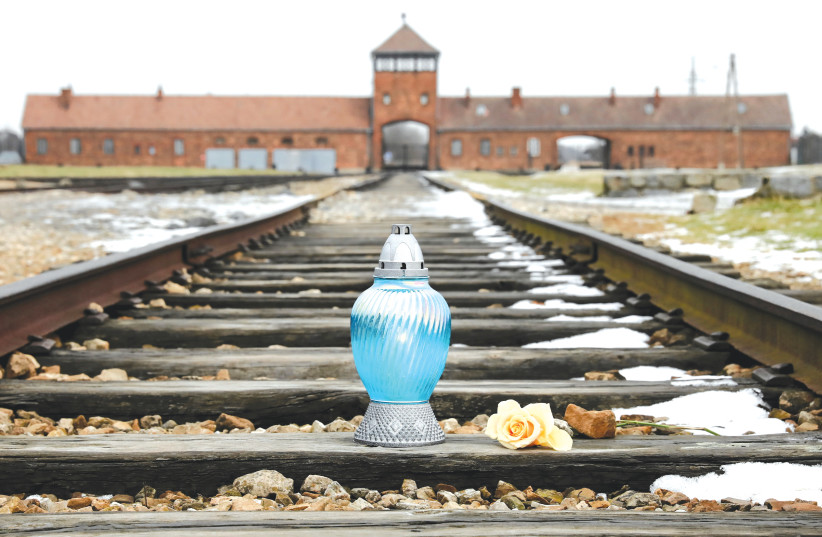On January 27, 1945, soldiers from the 60th Army of the First Ukrainian Front opened the gates of the Auschwitz concentration camp and liberated thousands of prisoners locked within. Seventy-eight years later, the world will pause to commemorate that moment on International Holocaust Remembrance Day, a day dedicated to the memory of the six million Jewish people murdered during the Holocaust.
Why designate a holiday for remembrance of the Holocaust? Because in the bleak history of genocide, the Holocaust is singular in its evil. If we speak of it casually and in the same breath as other mass killings, we will dilute its significance; if we ignore the Holocaust’s distinctive horror, we will forget it.
There’s never been a greater risk of forgetting, for two reasons. The first is mathematical: The number of living Holocaust survivors declines with each passing year. Today, there are an estimated 400,000 survivors; by 2030, that number will decline by 75 percent. Once they are gone, those stories are lost to time, as is some meaningful portion of Holocaust memory.

The second reason is more pernicious: There are active campaigns to deny the existence of the Holocaust or to minimize its place in history. In recent years, these falsehoods have found greater support than ever, with ordinary people taking to public platforms to argue that gas chambers were never used against Jews or that the Final Solution was about deporting Jews, not killing them.
These depraved fabrications gain strength as the Holocaust recedes in time. Which is why Resolution 60/7—the 2005 UN resolution that gave birth to International Holocaust Remembrance Day—asks member-nations to reject “any denial of the Holocaust as an historical event, either in full or part.” That such language had to be inserted in this document testifies to the pervasiveness of Jew hatred, and the real risks that the memory of the Holocaust will be distorted or diluted.
This year, we have at least some cause for hope. Just weeks ago, the United Arab Emirates announced that it would begin teaching Holocaust education to primary and secondary school students, making it the first Arab nation to do so. This happened because of the Abraham Accords, the 2020 pact that normalized the UAE’s relationship with the nation of Israel. The UAE’s educational campaign comes on the heels of a Holocaust memorial exhibition held late last year at the Crossroads of Civilisations Museum in Dubai.
The UAE’s efforts deserve worldwide praise and support. For the first time in an Arab nation, young people will learn of what took place at Auschwitz and Birkenau, and they will be exposed to a history that has been hidden from them for generations. These are new seeds of historical memory, and they deserve to be nurtured and honored.
The UAE’s actions are also an important challenge to the world, including to the United States. More than half of US states do not require Holocaust education. In a Pew Survey, more than half of Americans didn’t know the number of Jews killed in the Holocaust. And most terrifying of all: In the first-ever 50-state survey on Holocaust knowledge among Millennials and Gen Z, 20 percent of young people believed that Jewish people caused the Holocaust.
What can be done about this shameful ignorance of history? We must rededicate ourselves to the work of Holocaust education, at both the institutional and individual level. Such an effort needn’t begin from on high: Today, turn to someone at your dinner table and ask if they know the name of one of the Nazi concentration camps. If they cannot, tell them the story of the Holocaust, as best you can and in a way that’s appropriate for them. Use the names of the camps—Dachau, Auschwitz, Buchenwald, and work camps like Flossenburg—and explain the noxious Nazi ambitions to exterminate an entire people.
That small act of education can prove as important as a formal, national commitment. Holocaust remembrance requires both, just as it requires that the world discredit those who would deny the Holocaust and its horrible particulars. On this day, let us commit ourselves to this work—at our tables, in our schools, in our nations, and more importantly, in our memories.
Paul Packer is the former Chairman of the United States Commission for the Preservation of America's Heritage Abroad.
